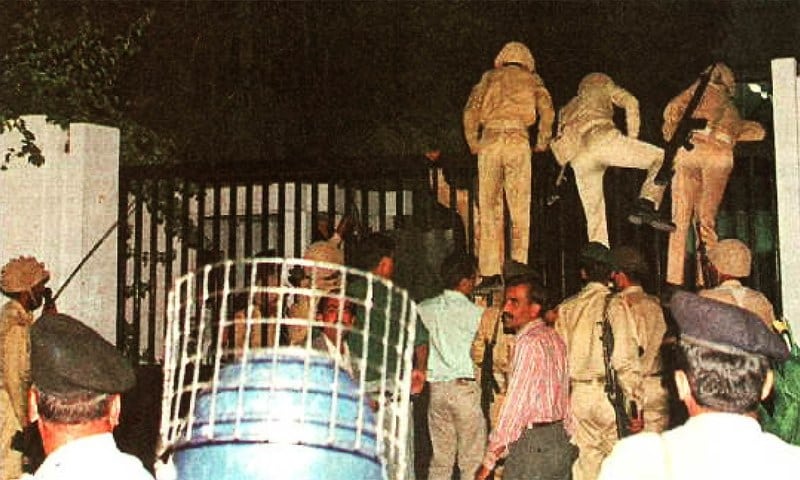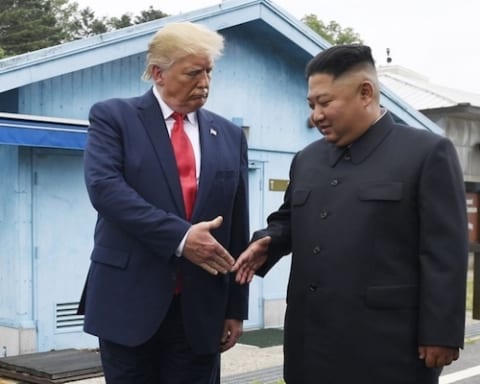Pakistan’s military has always been willing to intervene in politics, and a political party is challenging its authority. A months long campaign to undermine the Pakistan Muslim League appears to have paid off.
Pakistan’s voters may have driven the Pakistan Muslim League – Nawaz (PML-N) political party out of power. Former cricket star and likely Prime Minister, Imran Khan has claimed victory in the elections, with polling data showing that his party, Pakistan Tehreek-e-Insaf (PTI), is likely to hold a 2-1 advantage over PML-N in the parliament.
Casting a shadow over the proceedings, PML-N’s leadership, along with several other minor parties, are refusing to accept the results, accusing the country’s military establishment of rigging the vote against them. Prominent local media outlets have backed up the reports, and Khan has announced his intention to partner with the opposition to investigate the situation.
Meanwhile, terrorists turned voting in Pakistan’s July 25th elections into the running of a gauntlet.
Election day saw multiple bombings and shootings targeting polling stations. The most deadly attack was a suicide bombing which killed 31 and injured scores in the city of Quetta.

The violence in this election cycle reflects the polarization of the nation between the two most popular parties. Khan’s PTI party challenged the PML-N, and Khan campaigned as an anti-corruption crusader to clean up after the PML-N. PML-N members have been the target of numerous corruption charges, including charges targeting the top of the party.
People of Pakistan must come out and vote tomorrow in this historic election. This is the first time in 4 decades the nation has a chance to defeat the entrenched status quo. Don’t miss this opportunity.
— Imran Khan (@ImranKhanPTI) July 24, 2018
In April 2017, the Supreme Court set up a team to investigate allegations against Pakistani Prime Minister Nawaz Sharif and his family arising from the Panama Papers, which included officials from Pakistan’s Inter-Services Intelligence and Military Intelligence. As a result of the court’s anti-corruption drive, Mr. Sharif and his daughter were taken into custody upon their arrival in Lahore two weeks ago. The Sharifs were in London where Mr. Sharif’s wife, Kulsoom Nawaz, was undergoing cancer treatment before she suffered a heart attack and was placed on life support.
In a statement during his layover in Abu Dhabi on his way to his arrest, Mr. Sharif stated, “There are [about] 10 days to the election. Is this how elections are held?” he asked. “If the elections have no credibility, then who will accept the results?” These legal troubles have damaged the PML-N, giving PTI and Mr. Khan an edge in the campaign.
Mr. Khan achieved national prominence in Pakistan as a leading cricket player on the team which defeated England in 1992. 39 years old and suffering a shoulder injury, Khan sought politics as a new profession.
Since then he has built credibility through leveraging his celebrity for fundraising, and in 2013 his party gained control of Khyber-Pakhtunkhwa, a sparsely populated province in the northwest. PTI was tasked with picking up the pieces in the province which was subject to nearly a decade of fighting as the Afghanistan war spilled over the boarder. The party managed to improve services in the region and avoid corruption charges.
Khan is not without weak points. He has been married three times, and has struggled to distance himself from a reputation as a playboy. The main charge against him deployed by the PLM-N is an accusation that he is collaborating with the military in a campaign to oust the ruling party.
Pakistan has one the most political active militaries in the world, having spent three decades under military rule since independence. The nation’s intelligence services have frequently intervened to under cut parties they disagree with. Mountains of circumstantial evidence exist that the military has done everything it can to drive the PLM-N out of power.

In November 2017, the military refused orders from their civilian leaders to disperse protests in the capital. One general was even photographed distributing money to protestors. The government was forced to capitulate to protester demands.
The Economist reported that members of parliament (speaking anonymously) were threatened by the military into leaving the PLM-N. This could account for a wave of defections from the PLM-N party over the last year, including the sudden defections to BAP earlier in the year. The BAP is pro-military.
Media entities supportive of the PLM-N have also come under attack.
Dawn, the oldest newspaper in the country, published an interview with Sharif in May, and within 3 days the military began blocking the distribution of the paper.
“The unwarranted blocking of the distribution of one of the main independent newspapers has yet again shown that the military are determined to maintain their grip on access to news and information in Pakistan,” Reporters without Borders said.
https://twitter.com/AWGoraya/status/1017731023642284033
Earlier that same month, Geo, Pakistan’s most watched TV news station, was suddenly and without explanation dropped by the nation’s cable providers.
Between its parliamentary defections, and its inability to disperse protests, the PLM-N has been rendered utterly ineffective as a governing party. So, for more than a year, ever more of the decision-making in the civilian quarter of government has been taken over by the judiciary. And the judiciary appears to be working in tandem with the military.
For example, when a candidate announced he would contest a seat held by a MP that split with the PLM-N, the judiciary issued an arrest warrant within hours. The candidate was arrested on the orders of the National Accountability Bureau (NAB), the same anti-corruption entity that saw to the arrest of Sharif. The NAB operates under odd rules that place the burden of proof on the accused. The country’s two-time prime minister was arrested because he could not prove that several London apartments were not acquired through corruption.
LIMA CHARLIE NEWS
Lima Charlie provides global news, featuring insight & analysis by military veterans and service members Worldwide.
For up-to-date news, please follow us on twitter at @LimaCharlieNews

![Image Pakistan’s military and its largest political party face off [Lima Charlie News][Photo: Reuters]](https://limacharlienews.com/wp-content/uploads/2018/07/Pakistan’s-military-and-its-largest-political-party-face-off.jpg)


![Blossoming Russo-Turkish alliance leaves U.S., NATO behind [Lima Charlie News]](https://limacharlienews.com/wp-content/uploads/2019/07/Russia-Turkey-alliance-leaves-U.S.-NATO-behind-480x384.png)

